By Alex Cosh
This interview with NDP candidate for West Vancouver—Sunshine Coast—Sea to Sky Country Avi Lewis was recorded on Friday, August 20, the day before disturbing images of police violence at Fairy Creek on Pacheedaht territory went viral on social media. After our interview, Lewis tweeted this statement about the police aggression: "The world is horrifically upside down. Our province is on fire, and the people defending trees are being brutalized. Meanwhile, the corporations responsible for planetary arson are rewarded with tens of billions of public dollars. We need to change everything right now." To read more about this situation, please check out our free Monday newsletter.
We are now over a week into the federal election campaign that comes amid the ongoing pandemic, raging wildfires and the myriad of other interconnected crises in so-called British Columbia and around the world.
Recently, The Maple spoke with Cheryl Cameron at Dogwood B.C. who said that the time for toeing party lines is over, and that instead voters should be looking for "mavericks" — people who are going to push federal parties to do better on tackling the climate emergency and hold them accountable in the House of Commons.
We sat down with filmmaker, educator and climate activist Avi Lewis, who is running for the NDP in the West Vancouver—Sunshine Coast—Sea to Sky Country riding.
This interview has been lightly edited for length and clarity. You can listen to the full audio version on SoundCloud here.
Alex Cosh, managing editor at The Maple:
Avi, Do you consider yourself to be a maverick candidate?
Avi Lewis:
I don't know! I'm a 54 year-old rookie. My conviction and my motivation is that we are in a terrifying series of interconnected emergencies, as you hinted at in your intro, and it is time for all of us who are paying attention to get out of our comfort zones, and do whatever we can think of, and I've spent 30 years in activist journalism, social movements, storytelling, climate activism, filmmaking, and I think we are building power on the outside, and we need more accomplices on the inside, because if we have to slash our emissions at least in half in a number of years, much less than a decade, we simply need government action now. And so we just must have an electoral interface if we're serious about confronting not just the climate emergency, but all of the cascading linked emergencies.
AC:
Justin Trudeau recently announced a promise to train 1,000 new firefighters to combat wildfires, which we know are currently destroying communities and homes across British Columbia. What do you think of this announcement given the Liberal government's climate record to date?
AL:
I mean, it's a painful irony to suggest putting out the fire when your policies have stoked it, and I think it's very painful for communities across the Interior of this province right now.
One of our campaign team was trying to make calls to voters last night and was watching the smoke roll in over Ladysmith, which I'm looking across the Salish Sea at that fire right now. We've had smoke season in British Columbia for a number of years now, and each year it gets more terrifying.
This year, we had the first mass casualty event of the climate emergency era. The number of people who died, 569 excess unexpected deaths in the heat dome, I mean, in the language of my people, it takes a lot of Chutzpah to be a prime minister that bought a pipeline, that gave more than $18 billion to the fossil fuel industry in 2020, that, with this incredible story from The Breach, established a secret committee for the oil and gas industry during the pandemic, which had four and a half lobbying contacts a day with the Government of Canada, and then to roll in in a cynical snap election and talk about training more firefighters? I mean, it's insulting, frankly.
AC:
On the subject of the Trans Mountain expansion project, obviously the federal NDP has repeatedly expressed its opposition to that project. But I didn't see an explicit commitment in the party platform to actually canceling the project. So, whatever the makeup of the next Parliament, what would you do as an MP to stop the construction of more fossil fuel infrastructure in Canada?
AL:
Oh, absolutely, the party and the leader have been clear, absolutely against the Trans Mountain expansion project. That's a no brainer.
On the subject of the NDP climate platform, I'm actually really pleased and really proud to run on it, and the issue of fossil fuel subsidies has exploded under the Liberal government, and buying the pipeline that even the operators didn't want to run because it's not profitable.
More than that, the NDP platform has a real accounting for the climate impacts of the entire government, and this is utterly necessary for an emergency response. So, altering the mandate of the Bank of Canada to take into account climate accountability is a fundamental measure that could, you know, open the door to climate funding, funding for massive climate action coming from the Bank of Canada, and green bonds.
So there's the fiscal side, but also a lot of fossil fuel subsidies. And many of these projects are economically unviable, and so they need public money in order to stagger on and their dinosauric way. Export Development Canada and the Canada Pension Plan Investment Board are both up to their eyeballs in toxic fossil fuel investments around the world. And so the NDP in the platform says, climate accountability has to be baked in, and emissions reduction strategies have to be baked into the mandates of all of these important government agencies. That's a whole-of-government approach, and it does not bode well for fossil fuel projects, that's for sure.
AC:
Your credentials as a climate activist come quite a bit from the fact that you co-authored the Leap Manifesto. Obviously, one of the major challenges it faced at the time was the fact that there was an NDP government in Alberta that had embraced fossil fuel extraction. In B.C. today, we have a provincial government that gave the green light to LNG Canada; it's continuing to subsidize fossil fuel corporations, and it pushed through the (Coastal GasLink) LNG pipeline despite opposition from Wet'suwet'en and hereditary chiefs. So if the federal NDP was to cause a major upset and form government, what do you think the relationship between a governing NDP caucus and provincial governments might look like in terms of climate action and decolonization?
AL:
So let me get this straight: you're asking a rookie candidate to speculate on what happens if there's a majority government, and we're going to talk about inter-jurisdictional relations? No, look, the International Energy Agency, which is not exactly Greenpeace, which has really been the mainstream of the fossil fuel-dominated global energy community over decades, said that in order to meet Paris Agreement targets, and for a climate safe future, there can't be new fossil fuel infrastructure investments. This is now a scientific consensus. It's coming from these mainstream major organizations, and it's going to shape the next decade of whether or not we rise to this moment or not.
I think the ground is really shifting. The Leap Manifesto (was) six years ago now, and it has what was treated as wildly controversial at the time, I think it's now common sense. We're living in an emergency. People know it; it's at the surface of the skin of the body politic. And the question now is whether humans, all of us, and governments, all of them, are going to start acting like it's actually an emergency and start drastically cutting emissions with real regulations, and not with all these market incentives that big corporations can gain, and with none of the massive subsidies that governments all over the world at every level continue to pour in. Trillions of dollars of new fossil fuel investments from governments all over the world, since Paris. That has to be reversed on a dime, and we need to go in the other direction as a matter of existential urgency.
AC:
I think you're right about the fact that the ideas of the Leap Manifesto have basically become more mainstream than ever. It also seems like one of the main problems we're facing now is not so much outright climate denialism, but politicians who co-opt the language of radical climate action, and then ultimately do nothing about it, or very little about it. You've already spoken to some key parts of the NDP platform. What are some other priority action items that you can confidently say will make real change if they are enacted?
AL:
Well, the gigantic one in the NDP platform is carbon budgeting. I mean Canada under Trudeau is the only G7 country that's continued to increase emissions since Paris. You look at a country like the U.K., which has had either sort of right-wing Labour governments, like New Labour Blairite governments, or Conservative governments in these past couple of decades, and they've slashed their emissions by like more than 40 percent in the U.K., with the two parties, neither of which has really taken on a climate emergency stance.
How did they do it? They have an independent climate accountability office run on the basis of the science, and they have a carbon-budgeting system that doesn't look at how can we incentivize these corporations, who now know how to game every system, to dangle little cap and trade or other systems that they can use to get out of reducing emissions. Instead, a carbon-budgeting approach. The thing about carbon is you can count it. We know how much there is, and we know how much each country produces, and we know historically how much each country has contributed. So we all have a fair share of the remaining atmospheric space, and when you look at the carbon budget, you look at a household budget: how much do we have to spend? And then you apportion it fairly across jurisdictions, and countries have to figure out how to stay within that planetary limit.
That is in the NDP climate plan, carbon budgeting with an independent climate accountability office. Carbon budgeting, not just for the nation as a whole, but by sector, and that is absolutely the key measure. We've tried cap and trade; how about cap? There's no other fancy part to like, you know, incentivize these massive polluting corporations. No, we need a carbon budget approach. I'm super excited about that, and the NDP platform.
AC:
I think another really important feature of the Leap Manifesto, and also more recently the Green New Deal is the recognition of the link between climate justice and class struggle. Can you speak a little bit about why you think that's important, and do you believe the NDP is still the best political vehicle to unite these two struggles?
AL:
Yeah, this is something I've thought a lot about before I went into politics and chose this path, and actually, I think it's a critical point. We can't just have climate action. That was like climate movement 1.0. It was all about parts per million, and it was about techno solutions, and it didn't land with people, it didn't feel urgent, and it didn't speak to people's real daily working lives.
We need climate justice. If we're going to make this change, what the IPCC said in 2018, requires rapid, far-reaching and unprecedented changes in all aspects of society of what is necessary to secure even the chance of a safer future for all living things everywhere, then why would we not bring social justice, racial justice, gender justice, justice for all people into the changes, the massive changes that we have to make?
That was the whole point of the framing of the Leap Manifesto. It's the justice piece that the NDP gets and has always got better than any other party. My grandpa, David Lewis, who is one of the founders of the Co-operative Commonwealth Federation, wrote a book in 1943, called Make This Your Canada, and it was an argument about how Canada responded to the Second World War; the government led a massive societal mobilization, and instructed the captains of industry in a planned economy in the Second World War, what would be produced where and by whom. They still made lots of money, but Canada contributed massively to the war effort, and the argument in 1943 coming from David Lewis and Frank Scott, the great socialist poet, was we need to apply a wartime mentality to the war on poverty and inequality, and in that book in 1943, they talked about the 1 percent and the 99 percent, In 1943! I don't think the kids I was hanging out with in Zuccotti Park in 2011 were like reading my grandpa's book, but that's what's been baked into the DNA of the CCF/NDP from the beginning, the material conditions of working people, and that's the focus.
Jagmeet Singh has been absolutely stellar on this through the entire minority Parliament, and in this election campaign, talking about a wealth tax, talking about clawing back the corporate welfare that was doled out to the pandemic profiteers to the tune of $78 billion of increased wealth from from the billionaire class. We need that money back. It needs to be redistributed to people in the form of real, universal public services, and all of that fits perfectly with a climate mandate to slash our emissions at least in half, in much less than a decade, and actually get started on transformational change.
So that justice part is absolutely key. And there's another reason why too, it's not just a moral argument. It's a strategic necessity. We need an all-in people's movement, that was what my grandpa was calling for in the 1940s. And to build an all-in people's movement, a social consensus, a true society-wide mobilization for change, people need to see their lives getting better, not in 25 years for some 2050 target — now, right now.
People are vulnerable; they are hurting; they're scared in the fourth wave; they've come out of 18 months of isolation and loneliness; there's an employment crisis among young people; there's a disaster among among seniors who have been dying in for-profit, long-term care homes, another thing the NDP will do away with, and that is very clear in this platform. We need to put the needs of working people first in the way we make this gigantic transition, and to go back to the way you introduced this whole conversation: we live in a period of interconnected crises. We need solutions that solve multiple problems at once, and we need to connect up and link up the human power to drive that change, both in the outside and social movement world, and in the inside in the political system. There's no other party in Canadian political history that offers the opportunity to connect the dots the way the NDP does, and Jagmeet Singh I feel is really leading on that in this election campaign so far.
AC:
You're running in a riding that's not traditionally known for its embrace of class struggle. So how is this kind of message going to go down in places like West Vancouver, which spans some of the wealthiest neighborhoods in Canada?
AL:
It's a big weird riding that I'm running in. It really is three ridings. West Vancouver is one of the wealthier parts of Canada, or has some of those pockets. Sea to Sky is a stunningly beautiful tourist oriented economy, very outdoorsy, Squamish and Whistler, and then there's the farming community of Pemberton, and then there's the Sunshine Coast where I live, which is a little bit more alternative culture, but also post-resource extraction. The pulp mills, there's only one left, and the fishing economy, is almost gone, and forestry is not the contributor that it used to be on the coast, so it is really a huge cauldron of different experiences and economic factors.
The truth is that as I've been fanning out across this gigantic riding, calling people on the phone, knocking on people's doors, we are just hearing climate, climate, climate and housing, because there's a massive housing crisis in this riding, and there's a labour shortage because people can't afford to live in the place where they want to work, and the number of people in this riding who are paying more than 50 percent of their income on rent is staggering, is heartbreaking.
The NDP is plan to spend $14 billion to build half a million units of housing, and not more market housing for developers to just speculate on and keep inflating this bubble that Trudeau has blown so dangerously big in the last six years, but non-market housing, public housing, co-op housing, housing that's actually directed at vulnerable populations, and people who actually work for a living and just, you know, want to buy a home as part of working your butt off all your life.
So we're finding that the climate emergency is just front and centre for people and the housing emergency is linked. And the notion that we could address those two crises, you know, with one big plan to build half a million units — that they should be zero emissions and we're starting to build new housing now — is really resonating here. And people in West Vancouver, they're looking out across the water at all those (oil) tankers, and they're thinking about the Trans Mountain expansion that the Trudeau government bought and paid for with our money, and is driving through against Indigenous resistance, against local community resistance.
You're going to have I don't know how many times more tankers. People are used to seeing container ships out therem, but all of a sudden, you're going to have dozens and dozens of these oil tankers going through. A spill in the inlet — what does that do to the communities in West Vancouver? What does that do to Ambleside Beach? What does that do to the waterfront views of those wealthy residents of West Vancouver? Everybody in a coastal community is on the frontlines of the climate crisis, and those messages are resonating extremely strongly throughout this riding.
AC:
I don't live in your riding, but I do live on the northern end of the Sunshine Coast on the traditional territory of the Tla'amin people. There's a good community of really dedicated climate activists up here. One of them, a friend of mine, recently said to me that he wasn't sure if he's glad that you're running in this election, because he wondered whether your energy is best spent inside of Parliament, with all of its constraints and frustrations, or outside of it building power on the activist front lines. What do you make of that, and why is your place now in parliamentary politics?
AL:
Why is your friend inside my head? Get them out of me! Yes, of course, I'm agonizing about this. I really think we need a dual power approach to change, to transformative change, and I know and have worked with so many incredible leaders in the climate justice movement, and some of us are trying to intervene in the electoral sphere.
Anjali Appadurai, one of the great climate justice thinkers and organizers, has just won the NDP nomination of Vancouver-Granville and (Hamilton Centre candidate) Matthew Green and (Winnipeg Centre candidate) Leah Gazan and (New Westminster—Burnaby candidate) Peter Julian were just endorsed by 350.org in the first round of their climate champion endorsements. So we have a climate caucus emerging in the NDP, which is really exciting, and I just think we need both, and I've been on the outside for 30 years in different capacities, and I don't diminish for a moment the importance of social movement organizing.
I feel like movement politicians like we've seen in the United States with the Squad, which grew after its first electoral electoral breakthrough, is a really exciting model to speak to working-class realities, to speak to young people who are graduating with student debt and unemployment stretching out as far as they can see, to speak to Indigenous communities, which are still being dragged through the courts by the Trudeau government to deny basic equality in education and health care for kids, residential school survivors. I mean, it's just like the coalition of social forces that is needed to build power on the outside is there and they need accomplices on the inside, and that's just what we've got to do now.
So I don't think any of us can stop pushing, and I think the strategic decision about an inside versus outside strategy is a personal one for anyone at a particular moment in the political reality in history and in their own life, and so this is what I'm doing right now, but that's not some cosmic judgment on what everybody else should do.
It's a weird thing to be a candidate in an election; I wouldn't recommend it for everybody. But it's also really exciting to have a short-term goal to try to win something in organizing terms, and springboard into the heart of the sausage factory of how laws get made in this country, and if I get to the other side of it on September 21, and I'm an underdog candidate, there's no question about that, but if I do get to it, then movement folks will know that they've got someone on the inside.


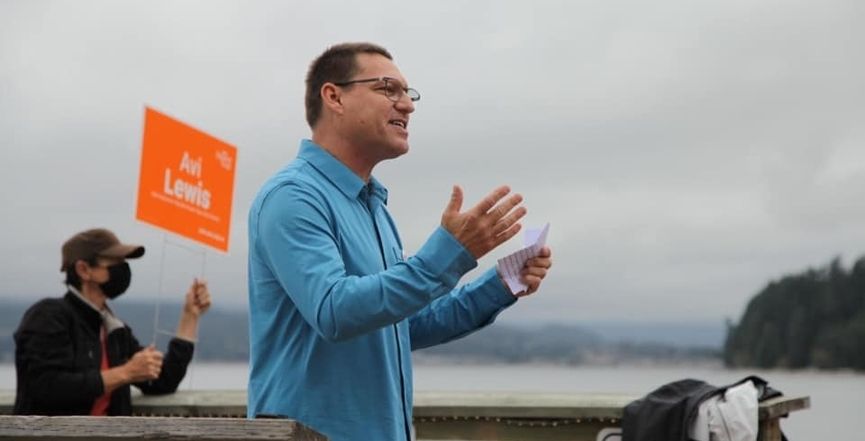

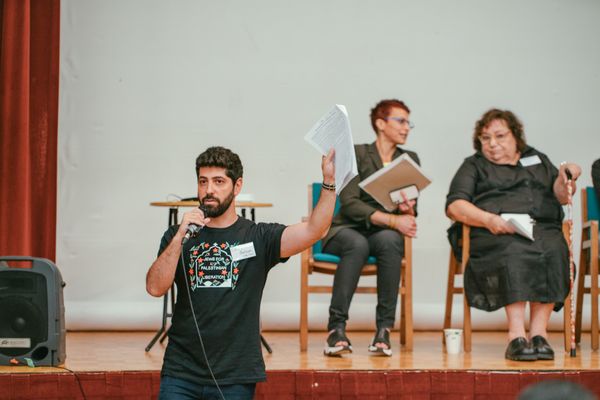
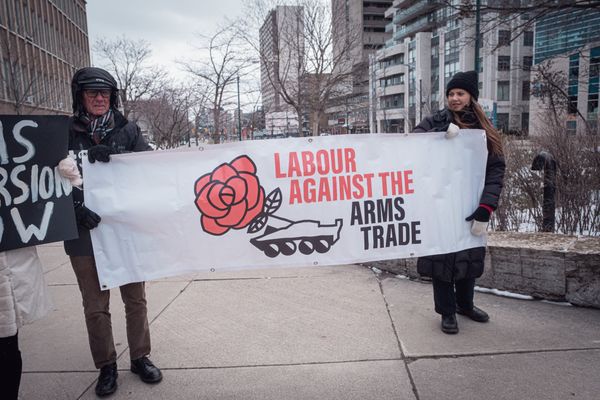
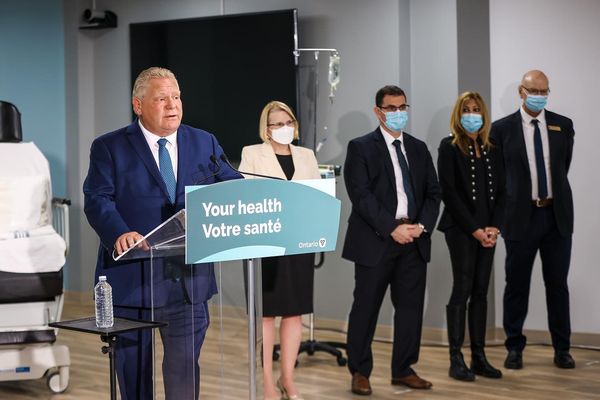
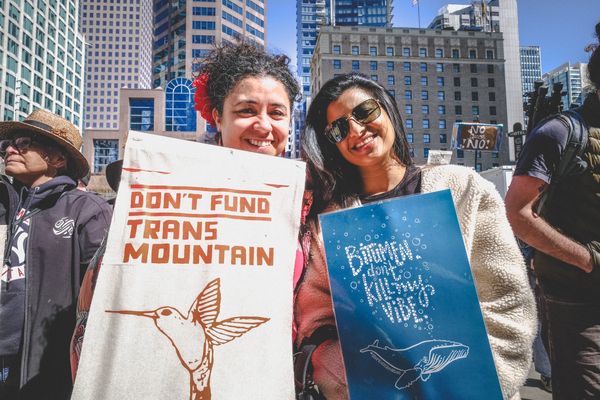
Member discussion